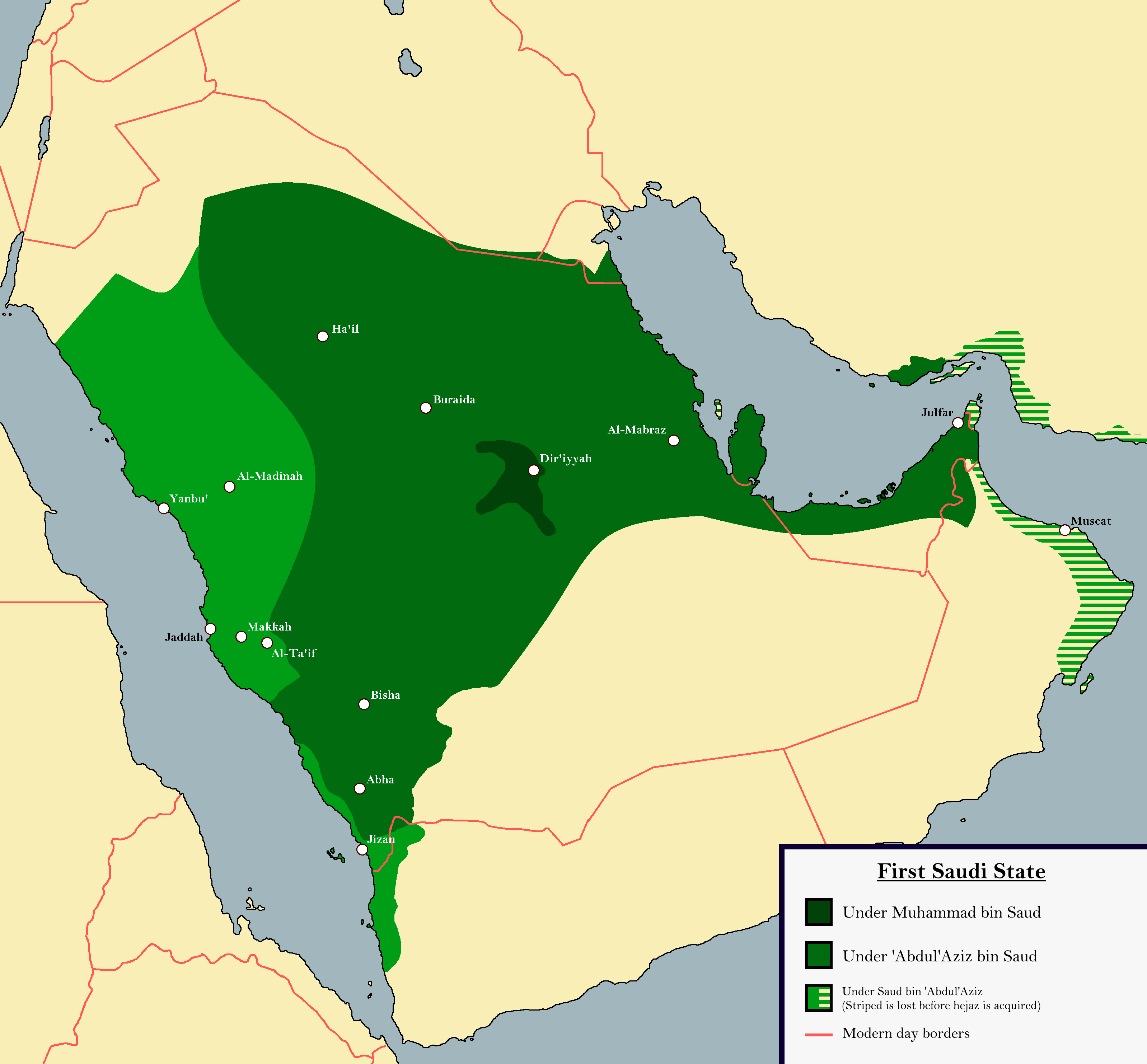|
Ibrahim Ibn Muhammad Al Ash-Sheikh
Ibrahim ibn Muhammad Al ash-Sheikh was a leading Salafi scholar in Saudi Arabia and minister of justice between 1975 and 1990. Background Ibrahim ibn Muhammad Al ash-Sheikh was born into the noted family of Saudi religious scholars, the Al ash-Sheikh, descendants of Muhammad ibn Abd al-Wahhab, the influential Muslim scholar.; He was the eldest son of Muhammad ibn Ibrahim Al ash-Sheikh, Grand Mufti of Saudi Arabia until 1969. Career Ibrahim ibn Muhammad was one of the most influential religious leaders in the early 1970s. He maintained a close relationship with Faisal of Saudi Arabia, King Faisal, with whom he met on a weekly basis. He believed that Saudi Arabia should take a leading role in the Arab world and pushed for Saudi involvement in war with Israel. Between 1975 and 1990, he served as minister of justice. Family His brother Abdullah ibn Muhammad Al ash-Sheikh, a younger son of the late Grand Mufti, also served as minister of justice, from 1993 to 2009. His grandson Turk ... [...More Info...] [...Related Items...] OR: [Wikipedia] [Google] [Baidu] |
Salafi
The Salafi movement or Salafism () is a reform branch movement within Sunni Islam that originated during the nineteenth century. The name refers to advocacy of a return to the traditions of the "pious predecessors" (), the first three generations of Muslims, who are believed to exemplify the pure form of Islam. Those generations include the Islamic prophet Muhammad and his companions, whom he himself taught (the ); their successors (the ); and the successors of the successors (the ). In practice, Salafis maintain that Muslims ought to rely on the Qur'an, the and the (consensus) of the , giving these writings precedence over later religious interpretations. The Salafi movement aimed to achieve a renewal of Muslim life and had a major influence on many Muslim thinkers and movements across the Islamic world. Since its inception, Salafism has been evolving through the efforts of numerous Islamic reformers, whose interpretations have spread within various regions. The Salafist ... [...More Info...] [...Related Items...] OR: [Wikipedia] [Google] [Baidu] |
Al Ash-Sheikh
The Al ash-Sheikh ( ar, آل الشيخ, '),Using the term ''the Al ash-Sheikh family'' is a pleonasm as the word ''Al'' already means ''family''. See Etymology. It would, in theory, be correct to use the term ''Family of the Sheikh'', but, unlike ''House of Saud'', in practice this is rarely done. also transliterated in a number of other ways, including Al ash-Shaykh, Al ash-Shaikh, Al al-Shaykh or Al-ShaykhAlso, ''Al al-Sheikh'', ''Al al-Shaikh'', ''Al-Sheikh'', ''Al-Shaikh'', ''Al-Ashaykh'', ''Al-Ashaikh'', or ''Al-Asheikh'', and the first word ''Al'' in any of these transliterations can be renderred as ''Aal''. is Saudi Arabia's leading religious family. They are the descendants of Muhammad ibn Abd al-Wahhab, the 18th-century founder of the Wahhabi sect of Islam which is today dominant in Saudi Arabia. In Saudi Arabia, the family is second in prestige only to the Saudi royal family, the Al Saud, with whom they formed a power-sharing arrangement nearly 300 years ago. The arrang ... [...More Info...] [...Related Items...] OR: [Wikipedia] [Google] [Baidu] |
Muhammad Ibn Abd Al-Wahhab
; "The Book of Monotheism") , influences = , influenced = , children = , module = , title = Imam, Shaykh , movement = Muwahhidun (Wahhabi) , native_name = محمد بن عبد الوهاب التميمي , relatives = Sulayman (brother) , office1 = Chief Qadi of the Emirate of Dir'iyah , term_start1 = 1744 C.E (1157 A.H) , term_end1 = 1773 C.E (1187 A.H) , successor1 = Abdullah ibn Muhammad ibn 'Abd al-Wahhab Muhammad ibn Abd al-Wahhab ibn Sulayman al-Tamimi ( ar, محمد بن عبد الوهاب بن سليمان , translit=Muḥammad ibn ʿAbd al-Wahhāb ibn Sulaymān al-Tamīmī; 1703–1792) was an Arabian Islamic scholar, theologian, preacher, activist, religious leader, and reformer from Najd in central Arabia, considered as the eponymous founder of the Wahhabi movement. His prominent students included his sons Ḥusayn, Abdullāh, ʿAlī, ... [...More Info...] [...Related Items...] OR: [Wikipedia] [Google] [Baidu] |
Muhammad Ibn Ibrahim Al Ash-Sheikh
Muḥammad ibn ʾIbrāhīm ibn ʿAbd al-Laṭīf ibn ʿAbd al-Raḥmān ibn Ḥasan ibn Muḥammad ibn Abd al-Wahhāb Al Shaykh Al-Tamīmī (1890–1969), was a Saudi Arabian religious scholar who was the Grand Mufti of Saudi Arabia from 1953 to his death in 1969. He is recognised as being amongst the forefront of Salafi theologians in history. Background Muhammad ibn Ibrahim Al ash-Sheikh was born in Riyadh in 1890 to the noted family of Saudi religious scholars, the Al ash-Sheikh, descendants of Muhammad ibn Abd al-Wahhab. His father was Sheikh Ibrahim ibn Abdul Latif Al As Sheikh, and his mother was Jawharah bint Abdul Aziz Al Hilali. He had a very religious upbringing. He memorized Quran in an early age. He lost his sight around the year 1328 AH, and he knew to read and write before losing sight. Rebellion of King Faisal As Grand Mufti of Saudi Arabia he gave a fatwa legitimising the armed rebellion of future King Faisal against his brother King Saud. Role as Grand Muft ... [...More Info...] [...Related Items...] OR: [Wikipedia] [Google] [Baidu] |
Grand Mufti
The Grand Mufti (also called Chief Mufti, State Mufti and Supreme Mufti) is the head of regional muftis, Islamic jurisconsults, of a state. The office originated in the early modern era in the Ottoman empire and has been later adopted in a number of modern countries. Muftis are Islamic jurists qualified to issue a nonbinding opinion (''fatwa'') on a point of Islamic law (''sharia''). In the 15th century, muftis of the Ottoman empire, who had acted as independent scholars in earlier times, began to be integrated into a hierarchical bureaucracy of religious institutions and scholars. By the end of the 16th century, the government-appointed mufti of Istanbul came to be recognized under the title '' Shaykh al-Islam'' (Turkish: ''şeyhülislam'') as the Grand Mufti in charge of this hierarchy. The Ottoman Grand Mufti performed a number of functions, including advising the sultan on religious matters, legitimizing government policies, and appointing judges. After the dissolution the ... [...More Info...] [...Related Items...] OR: [Wikipedia] [Google] [Baidu] |
Faisal Of Saudi Arabia
Faisal bin Abdulaziz Al Saud ( ar, فيصل بن عبدالعزيز آل سعود ''Fayṣal ibn ʿAbd al ʿAzīz Āl Suʿūd'', Najdi Arabic pronunciation: ; 14 April 1906 – 25 March 1975) was a Saudi Arabian statesman and diplomat who was King of Saudi Arabia from 2 November 1964 until his assassination in 1975. Prior to his ascension, he served as Crown Prince of Saudi Arabia from 9 November 1953 to 2 November 1964, and he was briefly regent to his half-brother King Saud in 1964. He was prime minister from 1954 to 1960 and from 1962 to 1975. Faisal was the third son of King Abdulaziz, the founder of modern Saudi Arabia, and the second of Abdulaziz's six sons who were kings. Faisal was the son of Abdulaziz and Tarfa bint Abdullah Al Sheikh. His father was still reigning as Emir of Nejd at the time of Faisal's birth, and his mother was from the Al ash-Sheikh family which has produced many prominent Saudi religious leaders. Faisal emerged as an influential royal politician ... [...More Info...] [...Related Items...] OR: [Wikipedia] [Google] [Baidu] |
Israel
Israel (; he, יִשְׂרָאֵל, ; ar, إِسْرَائِيل, ), officially the State of Israel ( he, מְדִינַת יִשְׂרָאֵל, label=none, translit=Medīnat Yīsrāʾēl; ), is a country in Western Asia. It is situated on the southeastern shore of the Mediterranean Sea and the northern shore of the Red Sea, and shares borders with Lebanon to the north, Syria to the northeast, Jordan to the east, and Egypt to the southwest. Israel also is bordered by the Palestinian territories of the West Bank and the Gaza Strip to the east and west, respectively. Tel Aviv is the economic and technological center of the country, while its seat of government is in its proclaimed capital of Jerusalem, although Israeli sovereignty over East Jerusalem is unrecognized internationally. The land held by present-day Israel witnessed some of the earliest human occupations outside Africa and was among the earliest known sites of agriculture. It was inhabited by the Canaanites ... [...More Info...] [...Related Items...] OR: [Wikipedia] [Google] [Baidu] |
Abdullah Ibn Muhammad Al Ash-Sheikh
Abdullah ibn Muhammad Al ash-Sheikh (born 1948) is the chairman of the Majlis ash-Shura (Consultative Assembly) of Saudi Arabia since February 2009. He was the minister of Justice from February 1992 to February 2009. Background and education Abdullah ibn Muhammad Al ash-Sheikh is a member of a noted family of Saudi religious scholars, the Al ash-Sheikh. He was born in Diriyah in 1948 and was educated by his father, Muhammad ibn Ibrahim Al ash-Sheikh former Grand Mufti of Saudi Arabia. He also studied the interpretation of the Quran and jurisprudence principles with the late Sheikh Abdulrazaq Afifi. He attended the Shariah College in Riyadh (later renamed Imam Muhammad Bin Saud Islamic University) and graduated with a bachelor's degree in Sharia in 1975. He then studied Sharia at Al-Azhar University in Cairo and returned to Saudi Arabia to obtain a doctorate degree in 1987. He earned his PhD degree in Fiqh from Imam Mohammed bin Saudi University in 1987. Career After obtaining hi ... [...More Info...] [...Related Items...] OR: [Wikipedia] [Google] [Baidu] |
Saudi Arabian Wahhabists
Saudi may refer to: * Saudi Arabia * Saudis, people from Saudi Arabia * Saudi culture The cultural setting of Saudi Arabia is greatly influenced by the Arab and Islamic culture. The society is in general deeply religious, conservative, traditional, and family-oriented. Many attitudes and traditions are centuries-old, derived fro ..., the culture of Saudi Arabia * House of Saud, the ruling family of Saudi Arabia {{disambiguation ... [...More Info...] [...Related Items...] OR: [Wikipedia] [Google] [Baidu] |
Government Ministers Of Saudi Arabia
A government is the system or group of people governing an organized community, generally a state. In the case of its broad associative definition, government normally consists of legislature, executive, and judiciary. Government is a means by which organizational policies are enforced, as well as a mechanism for determining policy. In many countries, the government has a kind of constitution, a statement of its governing principles and philosophy. While all types of organizations have governance, the term ''government'' is often used more specifically to refer to the approximately 200 independent national governments and subsidiary organizations. The major types of political systems in the modern era are democracies, monarchies, and authoritarian and totalitarian regimes. Historically prevalent forms of government include monarchy, aristocracy, timocracy, oligarchy, democracy, theocracy, and tyranny. These forms are not always mutually exclusive, and mixed governme ... [...More Info...] [...Related Items...] OR: [Wikipedia] [Google] [Baidu] |



